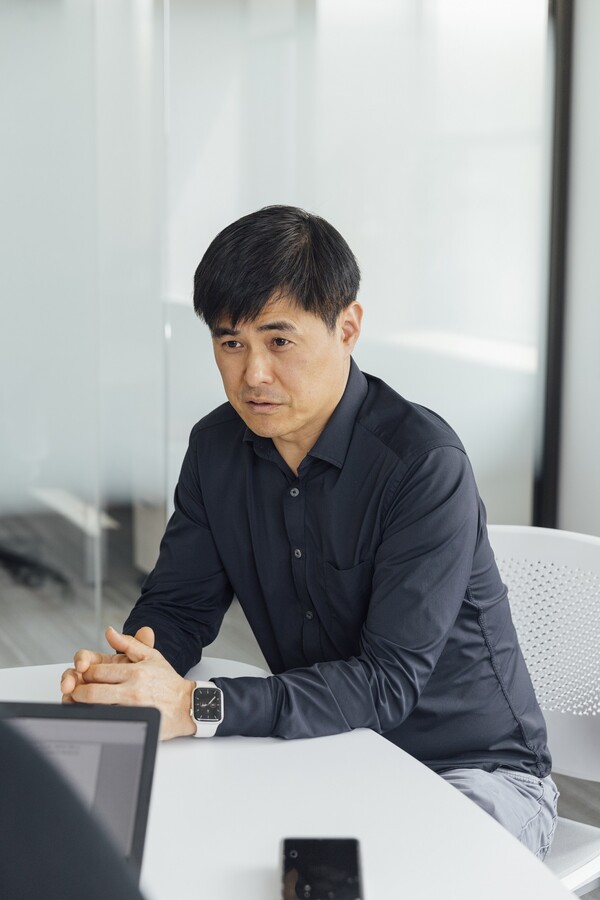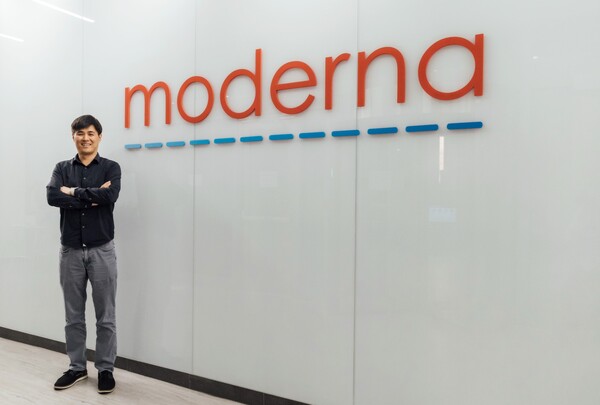BOSTON, Mass. -- By Lee Han-soo/Korea Biomedical Review correspondent – Driven by a passion for nucleotide chemistry and biochemistry, Dr. Jin Lim has played a pivotal role in the development and commercialization of Moderna's groundbreaking mRNA-based vaccines, including the SpikeVax, Moderna's Covid-19 vaccine.

His expertise in lipid and nucleotide development has propelled Moderna's research efforts in the fight against Covid-19 and the exploration of new vaccines using messenger RNA (mRNA).
Korea Biomedical Review met with Lim at Moderna’s headquarters in Cambridge, Mass., on June 8., to talk about his roles at Moderna and why he joined.
Lim's journey at Moderna began with his appointment as a principal scientist in process chemistry R&D.
In this role, he oversees the development of lipid and nucleotide components essential for the production of lipid nanoparticles (LNPs), a key element of Moderna's mRNA therapies.
Drawing from his background as a nucleotide chemist and a RNA chemical biologist, Dr. Lim brought a wealth of knowledge to his work.
Prior to joining Moderna, he honed his skills at Idenix, a wholly-owned subsidiary of Merck, where he focused on developing nucleotide drugs targeting RNA viruses such as hepatitis C.
When asked about his role in the commercialization of Moderna's Covid-19 vaccine, Dr. Lim describes it as an incredible story.
"The mRNA process, including the LNP formulation, played a central role in the rapid development of the vaccine," Lim said. "I and my team were able to leverage Moderna's extensive research conducted over the past decade to fast-track the development process."
Adhering to stringent regulations, such as the International Conference on Harmonization (ICH) and good manufacturing practice (GMP) guidelines, was essential, he added.
Despite the challenges, they successfully delivered a high-quality product within a remarkably short timeframe, ultimately receiving Emergency Use Authorization (EUA) from the U.S. Food and Drug Administration (FDA) in 2020.
Beyond the Covid-19 vaccine, Lim sheds light on some of the recent projects and initiatives he has been involved in at Moderna.
He outlined three key areas of focus -- the mRNA-1283 program, which aims to develop a prefilled syringe format Covid-19 vaccine that can be refrigerated, the expansion of mRNA-based vaccines to target flu, respiratory syncytial virus (RSV), and cytomegalovirus (CMV), and the development of mRNA therapeutics for individualized neoantigen therapy (INT) and rare diseases such as Propionic Acidemia (PA) and Cystic Fibrosis Transmembrane Regulator (CFTR).
In all three programs, Lim's expertise in process development and the manufacture of lipids and nucleotides plays a crucial role.
These initiatives signify Moderna's commitment to pushing the boundaries of mRNA technology and applying it to various therapeutic areas.
Lim also highlighted his vision for the future of medical treatment through mRNA is optimistic.
In his view, the potential of mRNA in medical treatment is vast and holds promising prospects.
"The remarkable evolution of the RNA field over the past four decades, driven by advancements in chemistry, has mRNA therapeutics and vaccines to gain significant traction," Lim said. "For example, the speed at which materials can be produced by changing RNA sequences is unbelievable, allowing for the development of individualized treatments for diseases such as melanoma."

Journey to developing Moderna Covid-19 vaccines
As a Korean scientist, Lim's journey to Moderna was influenced by his fascination with the concept of mRNA as medicine.
His previous work in developing nucleotide drugs to combat RNA viruses like Covid-19 and hepatitis C presented numerous challenges.
"However, the prospect of mRNA as a safer alternative, capable of producing natural human proteins and targeting specific genetic disease mechanisms, was very enticing," he said.
Thankfully, his friend, a Postdoc alumnus at Yale University, introduced him to Moderna's mRNA program, and he was captivated by the company's innovative approach.
When asked about his unique cultural experiences and perspectives at Moderna, Lim notes that he was the only Korean scientist when he joined in 2015.
"However, I did not encounter any specific challenges based on my nationality or ethnicity," he said. "Moderna's culture, characterized by idea-sharing and collaboration, stood out as distinct from my previous career journey."
Lim highlighted Moderna's encouragement of cross-disciplinary collaboration fosters an environment conducive to innovation.
During the interview, the Korean scientist also offered advice to fellow Korean scientists interested in pursuing a career in the U.S. biotechnology field or joining a company like Moderna.
He acknowledged the differences in the hiring systems between Korea and the United States.
"While Korea follows an open recruitment system, the U.S. mostly relies on position-driven recruitment, seeking individuals with unique talents aligned with specific job descriptions," he said. "Therefore, I advise Korean scientists to approach their career aspirations from multiple angles, gaining broad experience to identify their strengths and find the perfect fit within the U.S. biotechnology landscape."
Related articles
- [KBR Exclusive: Inside Boston Biocluster] Moderna's rise to prominence in the Covid-19 era and beyond
- [KBR Exclusive: Inside Boston Biocluster] Bayer spearheads cell and gene therapy advancement, shaping healthcare’s future
- [KBR Exclusive: Inside Boston Biocluster] Bayer pioneers precision molecular oncology for cancer breakthroughs
- [KBR Exclusive: Inside Boston Biocluster] Pfizer’s early clinical focus: boosting success, slashing costs
- [KBR Exclusive: Inside Boston Biocluster] Transforming R&D strategy and embracing innovation: Takeda R&D chief
- Moderna leaning on immunobridging studies to keep up with virus variants

